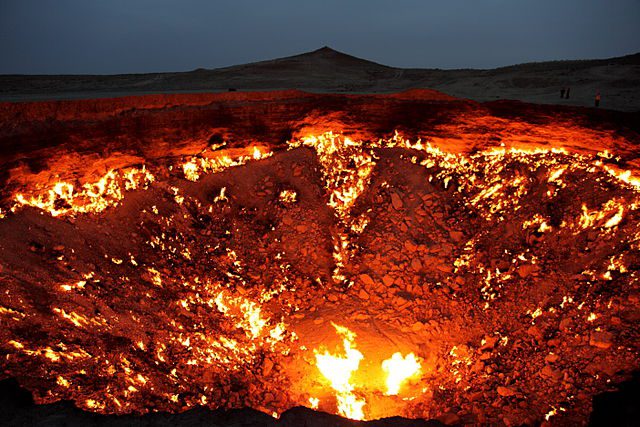
“The Door to Hell” (in the nighttime) / Turkmenistan, Darvaza [Wikimedia Commons / Creative Commons Attribution-Share Alike 2.0 Generic license]
* * *
(1998; Afterword: 8 February 2003)
* * * * *
The Greek meaning of aionios (“eternal,” “everlasting”) is indisputable. It is used many times referring to eternal life in heaven. The same Greek word is also used to refer to eternal punishments (Mt 18:8, 25:41,46, Mk 3:29, 2 Thess 1:9, Heb 6:2, Jude 7). Even in one verse – Mt 25:46 – the word is used twice: once to describe heaven and once for hell. “Eternal punishment” means what it says. There is no way out of this without doing violence to Scripture.
The Jehovah’s Witnesses render “punishment” as “cutting-off” in their bogus New World Translation in an attempt to establish their doctrine of annihilationism, but this is impermissible. If one is “cut off,” that is a one-time event, not an eternal one. If I am cut off the phone with somebody, would anyone think to say I am “cut off eternally?” This word, kolasis, is defined in Kittel’s Theological Dictionary of the New Testament as “(eternal) punishment.” Vine (An Expository Dictionary of New Testament Words) says the same thing, as does A. T. Robertson – all impeccable language scholars. Robertson writes:
There is not the slightest indication in the words of Jesus here that the punishment is not coeval with the life.
(Word Pictures in the New Testament, Nashville: Broadman Press, 1930, vol. 1, p. 202)
Since it is preceded by aionios, then it is punishment which continues forever (not non-existence which continues indefinitely). The Bible couldn’t be more clear than it is. What more could be expected?
Likewise for the related Greek word aion, which is used throughout Revelation for eternity in heaven (e.g., 1:18, 4:9-10, 5:13-14, 7:12, 10:6, 11:15, 15:7, 22:5), and also for eternal punishment (14:11, 20:10). Some attempt to argue that Revelation 20:10 only applies to the devil, but they must explain Revelation 20:15: “and anyone whose name was not found written in the book of life was thrown into the lake of fire.” The “book of life” clearly has reference to human beings (cf. Rev 3:5, 13:8, 17:8, 20:11-14, 21:27). It is impossible to deny that fact.
Now on to some annihilationist “proof texts”:
Matthew 10:28: The word for “destroy” is apollumi, which means, according to Vine, “not extinction, but ruin, loss, not of being, but of well-being.” The other verses in which it appears make this meaning clear (Mt 10:6, Lk 15:6,9,24, Jn 18:9). Thayer’s Greek-English Lexicon of the New Testament or any other Greek lexicon would confirm this. Thayer was a Unitarian who probably didn’t believe in hell. But he was also an honest, objective scholar, so he gave the proper meaning of apollumi, in agreement with all other Greek scholars. The same argument applies to Mt 10:39, Jn 3:16 (same word).
1 Corinthians 3:17: “Destroy” is the Greek, phthiro, meaning literally, “to waste away” (much like apollumi). When the Temple was destroyed in 70 A.D., the bricks were still there. it was not annihilated, but wasted. So shall it be with the wicked soul, which will be wasted or ruined, but not blotted out of existence. We see the meaning of phthiro clearly in every other instance of it in the NT (usu. “corrupt”), where in each case, the meaning is as I have said (1 Cor 15:33, 2 Cor 7:2, 11:3, Eph 4:22, Jude 10, Rev 19:2).
Acts 3:23 refers to simply being banished from the people of God, not annihilation. “Soul” just means a person here (cf. Deut 18:15-19, from which this passage is derived; see also Gen 1:24, 2:7,19, 1 Cor 15:45, Rev 16:3). We see this usage in English when someone says, “There was not a living soul there.”
Romans 1:32 and 6:21-2, James 1:15, 1 John 5:16-17 either refer to physical or spiritual death, neither of which means “annihilation.” The first is separation of body from soul, the second, separation of the soul from God.
Philippians 1:28, 3:19, Hebrews 10:39: “Destruction” or “perdition” is the Greek apolia. Its meaning as “ruin” or “waste” is clearly seen in, e.g., Matthew 26:8 and Mark 14:4 (a waste of ointment). In Revelation 17:8, when it refers to the Beast, it states that the Beast is not wiped out of existence: “…They behold the beast that was, and is not, and yet is.”
Hebrews 10:27-31 must be understood in harmony with Hebrews 6:2, which speaks of “eternal judgment” (mentioned above in discussion of aionios). The only way to synthesize all the data presented here is to adopt the eternal hellfire view. The counter-arguments, on the other hand, almost always have simple contrary explanations.
Hebrews 12:25, 29: Is 33:14, a verse similar to 12:29, says, “… who among us shall dwell with the devouring fire? Who among us shall dwell with everlasting burnings?” The metaphor of God as a fire (cf. Acts 7:30, 1 Cor 3:15, Rev 1:14) is not the same as hellfire, which is spoken of as eternal or unquenchable, within which the wicked suffer consciously (Mt 3:10,12, 13:42,50, 18:8, 25:41, Mk 9:43-48, Lk 3:17).
2 Peter 2:1-21: In v.12, “utterly perish” is from the Greek kataphthiro. In the only other place in the NT where this word appears (2 Tim 3:8), it is translated as “corrupt” in KJV. If the annihilationist interpretation were applied to that verse, it would read, “…men of nonexistent minds…”
2 Peter 3:6-9: “Perish” is the Greek apollumi (see comment on Mt 10:28 above), so annihilation, as always, is not taught, by virtue of the simple meaning of the Greek word. Furthermore, in v.6, where it is said that the world “perished” in the flood, it is obvious that it was not annihilated, but wasted, consistent with the other interpretations above.
Orthodox Christians must defend their beliefs as commanded in Scripture (1 Peter 3:15, Jude 3). This is a loving act, if what we speak is indeed the truth. The proclamation of biblical and Christian truth often makes people angry, but that should not deter us from doing it. On this issue, Protestants (excluding Adventists), Catholics, and Orthodox all agree (in their official doctrinal statements), so those squabbles don’t even enter into the discussion. That fact, along with the biblical evidence above, ought to be sufficient to put the matter to rest, for anyone who respects the Bible and Christian, apostolic Tradition.
I received the following letter, concerning the above reasoning:
I was reading your article on Biblical Evidence for an Eternal Hell and something caught my attention. In your article you cited:
There is not the slightest indication in the words of Jesus here that the punishment is not coeval with the life.
(Word Pictures in the New Testament, Nashville: Broadman Press, 1930, vol. 1, p. 202)
I have been studying Aion and Aionios and would conclude that the punishment is lasting or durational along with the life. There is the kolasin aionion and the zoen aionion. Translated eonian chastening and eonian life. Both run concurrently. I have found that aionion or (aionios) is that which pertains to the eons. It is the adjective which represents aion its noun. The adjective cannot be greater than the noun it represents in the Bible.
I, as of yet, have not found a scripture either in the LXX O.T. nor in the Greek N.T. which one would conclude that aion carried the idea of eternality i.e. no beginning, no end…or having a beginning but having no end. Therefore, aionios, being the word which pertains to the noun it represents, that noun being aion which does not mean eternal, aionios cannot refer to something which is eternal.
Apart from the eschatological (non-dispensational) interpretation of Matthew 25, which I don’t have the time to pursue (much as I would enjoy that – maybe sometime in the future), are you saying that neither life in heaven nor in hell are eternal? Or are you merely disputing the meaning of aionios in Matthew 25:46 and/or generally?
I still maintain that Matt 25:46 is crystal clear, and that aionios here means duration with no end. Greek Lexicons and biblical language reference works confirm this. For example, An Expository Dictionary of NT Words (W. E. Vine; Old Tappan, New Jersey: Fleming H. Revell, 1940, vol. 2, p. 43, under “Eternal”) pretty much sums it up, in my opinion, beyond argument:
Aionios describes duration, either undefined but not endless, as in Romans 16:25; 2 Tim 1:9; Titus 1:2; or undefined because endless, as in Rom 16:26, and the other 66 places in the NT.The predominant meaning of aionios, that in which it is used everywhere in the NT, save the places noted above, may be seen in 2 Cor 4:18, where it is set in contrast with proskairos, lit. ‘for a season,’ and in Philm 15, where only in the NT it is used without a noun. Moreover it is used of persons and things which are in their nature endless, as, e.g., of God, Rom 16:26; of His power, 1 Tim 6:16, and of His glory, 1 Pet 5:10; of the Holy Spirit, Heb 9:14; of the redemption effected by Christ, Heb 9:12, and of the consequent salvation of men, 5:9, as well as of His future rule, 2 Pet 1:11, which is elsewhere declared to be without end, Luke 1:33; of the life received by those who believe in Christ, John 3:16, concerning whom He said, ‘they shall never perish,’ 10:28, and of the resurrection body, 2 Cor 5:1, elsewhere said to be ‘immortal,’ 1 Cor 15:53, in which that life will be finally realized, Matt 25:46; Titus 1:2.
Aionios is also used of the sin that ‘hath never forgiveness,’ Mark 3:29, and of the judgment of God, from which there is no appeal, Heb 6:2, and. of the fire, which is one of its instruments, Matt 18:8; 25:41; Jude 7, and which is elsewhere said to be ‘unquenchable,’ Mark 9:43.
Likewise, A. T. Robertson:
The word aionios . . . means either without beginning or without end or both. It comes as near to the idea of eternal as the Greek can put it in one word. It is a difficult idea to put into language. Sometimes we have ‘ages of ages’ (aiones ton aionon).
(Word Pictures in the New Testament, Nashville: Broadman Press, 1930, vol. 1, p. 202 [under Matt 25:46] ) }
Thayer’s Greek-English Lexicon also concurs, as does Kittel’s Theological Dictionary of the New Testament, the most revered and respected Greek analysis of the New Testament.
This is overwhelming linguistic and exegetical evidence which you would be hard-pressed to refute, I think.
The following discussion took place on my Apologetics / Ecumenism Discussion List:
John Stott, of all people, would “deny that the Bible is trustworthy, and assert that it contains blatant falsehood”?
In effect, yes – if he denies the eternality of hellfire.
Not hardly! Stott is a well-known and highly respected evangelical . . .
So now the term “evangelical” encompasses heterodoxy on the doctrine of hell? What other heterodox doctrines (i.e., from within traditional evangelical “orthodoxy”) are now up for grabs, too? What about, e.g., a personal devil?
. . . who emphatically affirms the absolute authority of the bible. He has a very high view of Scripture.
Affirming it and living it out are two different things. Unfortunately, many professed Christians dishonestly sign on to, and claim to adhere to creeds and confessions which they no longer completely believe. I was just as indignant about that as an evangelical as I am now.
Many people who have such a high view of Scripture nevertheless interpret it differently. It seems pointless and tendentious to insist that those who disagree with your interpretation are denying the trustworthiness of the Bible.
Tell me, then, is there any doctrine, the denial of which would lead you to suspect that the holder of the view is (consciously or not) denying the infallibility of the Bible? It seems to me that us “theological conservatives” make that charge about theological liberals all the time. I’m saying that there are certain doctrines that are so clear in Scripture that denying them brings into doubt one’s overall view of Holy Scripture.
As for it being my (“your”) interpretation, sure (and obviously); however (and this is my whole point), it has also been the consistent interpretation of all the major branches of Christianity: Catholic, Orthodox, Anglican, and Protestant. That makes it a bit more than merely “my” interpretation, wouldn’t you think? Going against all that Christian tradition and consensus strikes me as an extreme “individualist” position, where the person cares little about what 99% of all Christians for 2000 years have believed about a particular doctrine. So Stott says this is his interpretation. Why should we believe him, pray tell? St. Paul and others issue many stern commands and warnings about believers departing from what was “received” from Jesus and the apostles (Lk 1:1-2; 1 Cor 11:2; 15:1-2; 1 Thess 2:13; 2 Thess 2:15; 3:6; 2 Tim 2:2; Jude 3).
Biblically speaking, there is no such thing as a doctrine springing up many hundreds of years after Christ with little or no precedent among Christians (again, of all major branches). So Stott has violated Scripture on two counts: a denial of what virtually all Christians have considered a clear biblical teaching, and introducing historical novelties.
By the way, I have been one of those who has respected and benefited from John Stott. So perhaps in my disappointment I am overly harsh. I think, though, that I am merely applying clear biblical mandates with regard to heresy. Paul issues anathemas, and commands us not even to fellowship with heretics, and those who cause divisions, and who introduce teachings not “received” from the Apostles. So I haven’t even gone as far as he probably would have . . .
But on the assumption that there will be a hell, I have never read a defense of its endless duration that made sufficient sense to me. Therefore annihilationism seems more reasonable, and in particular, more consistent with the unlimited mercy of God.
The ins and outs of the understanding of the doctrine cause you difficulty (which is fine: I wonder about predestination and the problem of evil all the time myself), but can you really positively assert that the Bible teaches no such thing, given the overwhelming biblical indications above?
Now, concerning the place of scripture in this controversy, I disagree that Scripture is sufficient by itself. Scripture is among the relevant data, but if it conflicts with sound moral principles and/or logic, it cannot be affirmed on pain of immorality or irrationality.
But of course that can’t happen in any consistent Christian system. Such a scenario makes no sense to those of us who wholeheartedly accept the inspiration and infallibility of Scripture. Beyond that, I don’t see how we could definitively resolve this question, unless you think people can die and come back and tell us if they had a second chance.
The essence of hell is separation from God. God in effect says: “so you want to live apart from Me? You think that is a preferable state of affairs to living with Me? Very well, then, go ahead; see how you like it.” Of course, God would have a great deal more love and compassion than that (I’m applying human emotions to Him — a sort of anthropomorphism in reverse), but this is the basic idea. The Bible talks about God giving men up to their own devices and the hardening of their hearts (the same sort of notion).
C. S. Lewis stated that “the doors of hell are locked from the inside.” God respects human free will so much that He is willing to let men reject Him and spend eternity away from Him, if that is their choice. Of course, those who choose this don’t have the faintest idea of what an existence utterly without God is like, because they have not yet experienced it. This is the tragic folly of the whole thing.
The instant they do experience it, they’ll know what a terrible mistake they made, and in my speculative opinion that will be the primary horror of hell: the intense, irreversible self-loathing, self-hatred, and regret at having made such a stupid and perfectly avoidable mistake as to end up in an unspeakably dreadful, hideous place or state like hell.
We know from this life how difficult it is to live with bitter regret: the mulling over the “if only’s” of life and our bittersweet journey through it.
Imagine doing that for eternity! And, of course, this is one big reason why Christians want to proclaim the gospel, so people can avoid that miserable fate, and can live eternally the way God intended them to live, without suffering and sin: complete, whole, perfect creatures, rejoicing in God’s wonderful presence forever.













